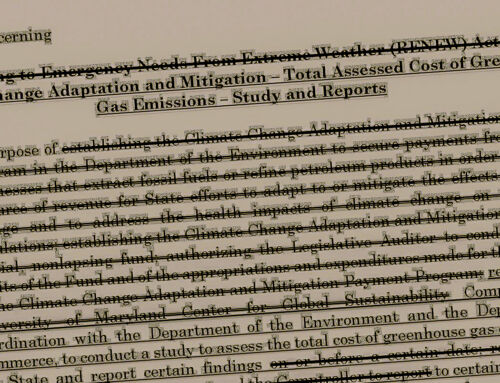View by Topic
Recent Articles
-
New Environmental Laws from the 2025 Maryland Legislative SessionSaturday, April 26th, 2025
-
Migratory Bird Treaty Act Does Not Prohibit Incidental Take – AgainSaturday, April 19th, 2025
-
President Trump’s Bold Step to Rein in State Overreach in Climate ChangeSaturday, April 12th, 2025
-
Mandatory GHG Disclosures in Maryland Real Estate ContractsSaturday, April 5th, 2025
View by Month/Year
“Green Building Law Update” Headlines
Recent Articles & News from
Stuart Kaplow’s blog
at GreenBuildingLawUpdate.com
- BEPS Redux: The Most Far Reaching Environmental Legislation of the 2025 Maryland General Assembly May 4, 2025
- New Environmental Laws from the 2025 Maryland General Assembly Session April 27, 2025
- Migratory Bird Treaty Act Does Not Prohibit Incidental Take – Again April 20, 2025
- President Trump’s Bold Step to Rein in State Overreach in Climate Change April 13, 2025
Subscribe to the Green Building Law Update!
Stuart Kaplow brings his expertise and extensive experience to the table with his unique digital publication, "Green Building Law Update". Subscribers receive regular updates to keep them informed about important issues surrounding Environmental Law, Green Building & Real Estate Law, as well as the emerging demand for Environmental Social Governance (ESG).
Get fresh content through the lense of Stuart Kaplow's cutting-edge expertise, innovative commentary and insider perspective. Don't miss another issue! Subscribe below.

The Power of Methane: Why Tackling Emissions Is Key to Curbing Climate Change
When it comes to combating climate change and reducing greenhouse gas emissions, the focus has primarily been on carbon dioxide emissions, however among increasing numbers of those expert in one or more of the natural or physical sciences, the case for prioritizing the reduction or elimination of methane emissions is gaining recognition due to its heightened global warming potential. In this blog post, we will explore why targeting methane emissions presents a more advantageous strategy for the United States in its quest to mitigate climate change.
Methane’s Warming Potential: Methane, a colorless, odorless, and highly flammable gas that occurs abundantly in nature and from a variety of anthropogenic activities, has a considerably higher global warming potential than carbon dioxide. Over a 20 year period, methane is estimated to be more than 80 times as potent as carbon dioxide in terms of trapping heat in the atmosphere. Although methane concentrations are comparatively lower, a United Nations report last year said it was responsible for more than 25% of the global warming we are experiencing today. In the short term, reducing methane emissions can have an immediate impact on slowing down global warming. This makes methane reduction crucial for addressing the urgency of climate change and buying time for the development and implementation of longer term greenhouse gas strategies.
Quick Acting Impact: Unlike carbon dioxide, which can persist in the atmosphere for centuries or maybe millennia, methane has a relatively short atmospheric lifespan of approximately 12 years. (Curiously, methane molecules are broken down by chemical reactions in the atmosphere, primarily through interactions with hydroxyl radicals whose disintegration process converts methane into carbon dioxide.) One way to look at this is one pound of methane traps 25 times more heat in the atmosphere than a pound of carbon dioxide. So, by reducing methane emissions, we can rapidly decrease the amount of warming potential present in the atmosphere. This quick acting impact makes methane reduction an effective way to address the urgency of climate change and allow time for mid and long innovations for GHG mitigation to develop.
Emission Sources: Anthropogenic methane emissions are widely associated with fossil fuel (natural gas, oil, and coal production and transportation), although the largest sources are agriculture (from livestock farming [.. yes, each year, a single cow will belch more than 220 pounds of methane] to rice cultivation), followed by solid waste management (decay of food and other organic waste in landfills). Carbon dioxide emissions, on the other hand, arise almost exclusively from burning fossil fuels. Addressing methane emissions can be effectuated through specific strategies focused on these economic sectors much of that at reasonable first dollar costs while reducing carbon dioxide emissions necessitates a broader societal shift towards renewable energy, energy efficiency, and decarbonizing the economy at greater dollar costs.
Complementary Approach: Addressing methane emissions does not mean neglecting carbon dioxide reduction efforts. Carbon dioxide is significantly more abundant in the atmosphere, approximately 415 parts per million, compared to methane, less than 2 parts per million. In fact, tackling both methane and carbon dioxide emissions can yield substantial benefits. By reducing methane emissions, we can alleviate the near term pressure on the climate while simultaneously working towards a decarbonized future. This complementary approach enables us to optimize the effectiveness of our mitigation strategies today and create a more sustainable and resilient natural environment in the future.
Co Benefits for Human Health: Methane is a key precursor of tropospheric ozone (ground level), a harmful air pollutant. Increased methane emissions are responsible for more than half of the observed increase in tropospheric ozone levels. By curbing methane emissions, we can simultaneously reduce harmful air pollutants that have detrimental effects on human health, including respiratory illnesses and cardiovascular diseases. Addressing methane emissions, therefore, offers co benefits that extend beyond climate change mitigation and directly impact the well being of individuals and even plant life.
Economic Opportunities: Reducing methane emissions presents significant economic opportunities. Methane leaks and emissions occur throughout the energy sector supply chain, from production to distribution. Implementing strategies to minimize these leaks not only helps combat climate change but also conserves valuable energy resources. Moreover, investing in methane reduction technologies can drive job creation and foster new and expanding innovation in the clean energy sector and beyond, contributing to economic growth and energy security.
Policy and Feasibility: Both methane and other greenhouse gas emission reductions, including carbon dioxide, require public policy interventions, technological advancements, and society wide behavioral changes for meaningful reductions. The feasibility of those emission reductions may vary depending on the availability of technologies, economic considerations, the political will to implement mitigation measures, and maybe most important the willingness of societies on a planetary basis to be moved. Different sectors in economies, countries, and regions across the globe have varying capacities and opportunities for emission reduction, but methane targets are generally more focused and are now being seen as a target rich environment. Concomitantly, an emerging consensus is coming to conclude that current carbon dioxide centric approaches are a misapplication of the science.
Conclusion: Focusing today on methane emissions reduction and elimination offers unique advantages for the greenhouse gas mitigation. By recognizing methane’s heightened global warming potential, quick acting impact, complementarity with carbon dioxide reduction, co benefits for human health, and economic opportunities, we can today harness the power of methane to achieve significant strides in the fight against climate change. Taking action on methane emissions is a practical and strategic move that will immediately yield multiple benefits, bringing us closer to repairing the planet.
A live webinar “Greenwashing: How to Mitigate Your Risk” 30 talking points in 30 minutes, Tuesday, July 25 at 9 am ET presented by Stuart Kaplow and Nancy Hudes on behalf of ESG Legal Solutions, LLC. The webinar is complimentary, but you must register here.









